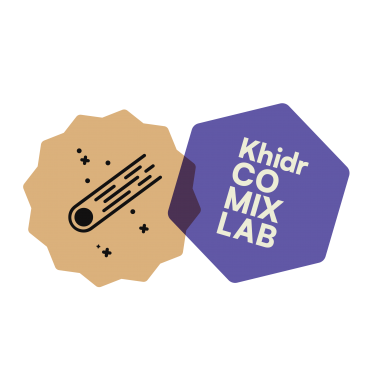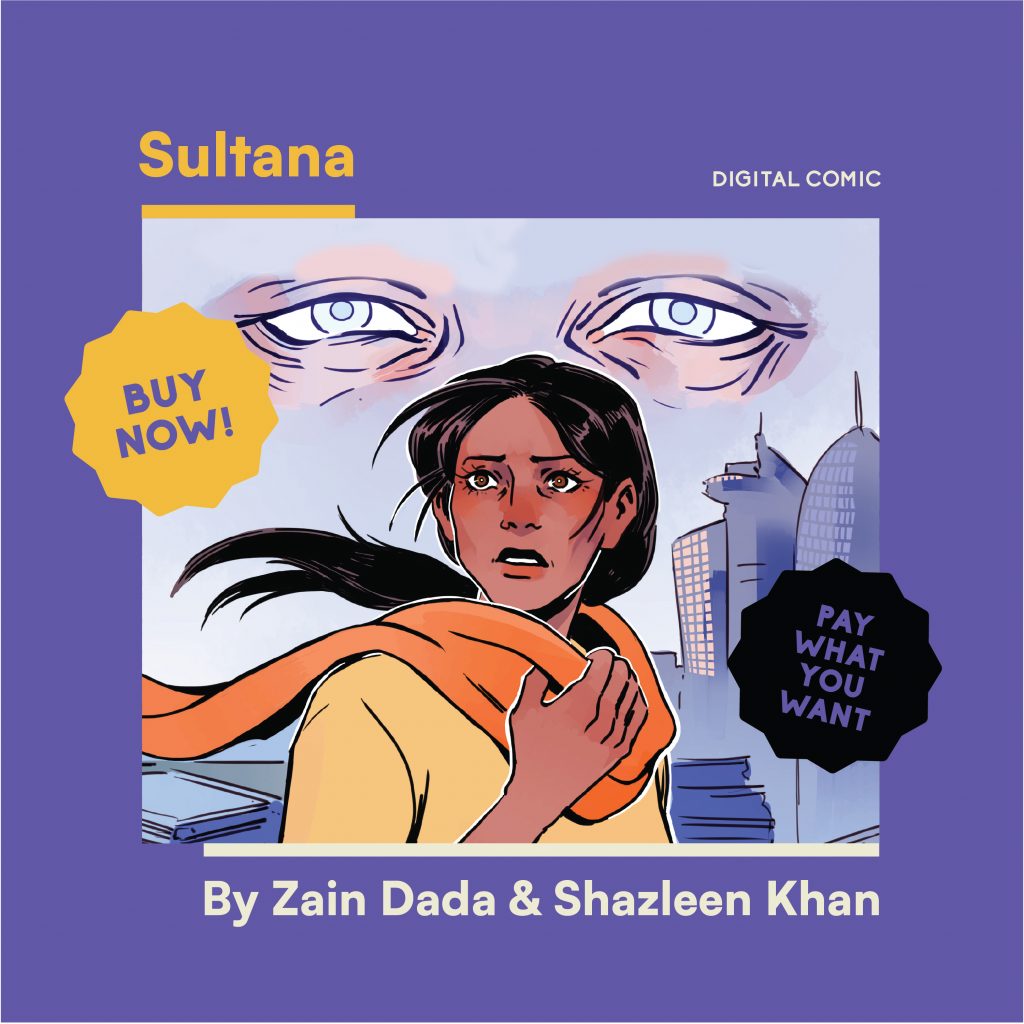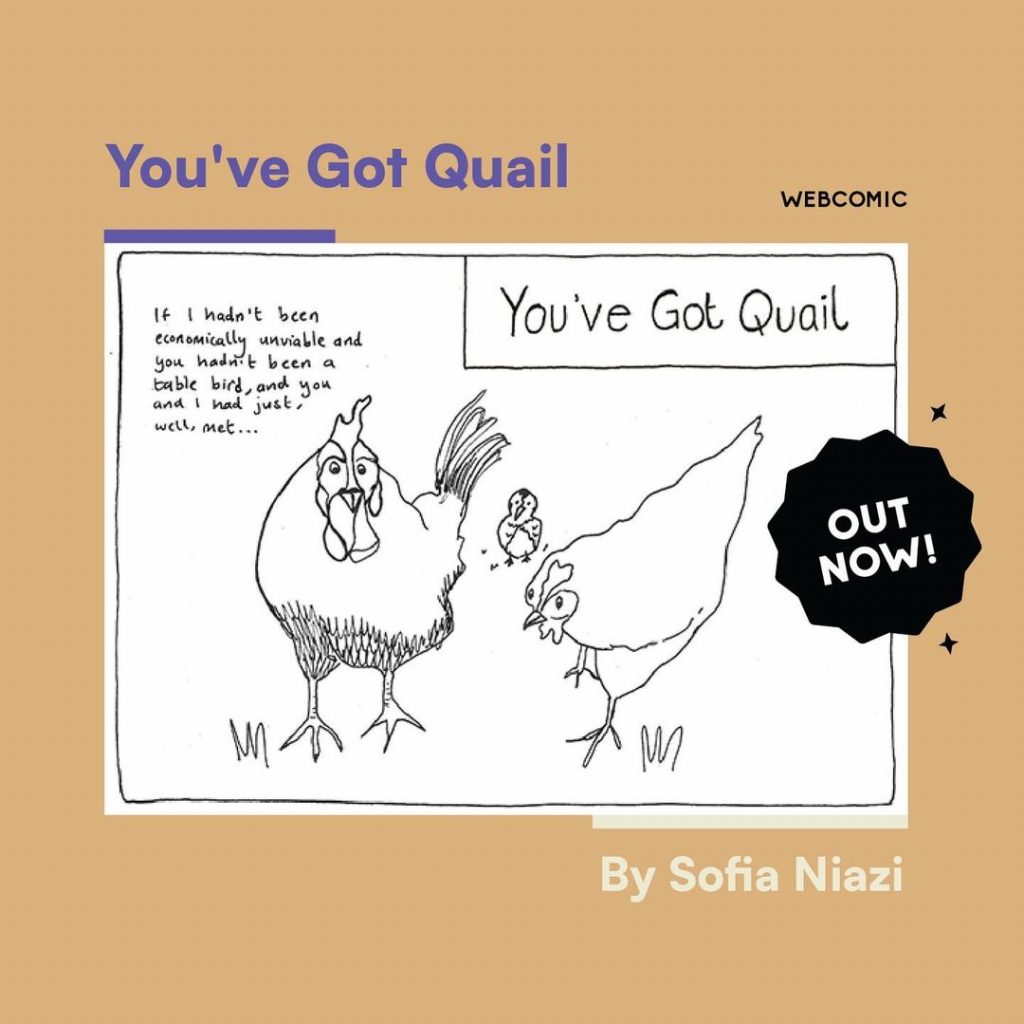Over the last 3 months, we’ve made it a point to talk with publishers and cartoonists who have been making comics through the uncertainties of a global pandemic and economic downturn. Through interviews and features, we’ve explored the goals of publishers and cartoonists alike. We’ve solicited these creators for advice and have received sage wisdom from people who have been making comics for decades.
But what about the publisher that wants to start something new? Where do you start – and what stories do you tell? Enter Khidr ComixLab (KCL), a London-based micropublisher that launched December 14th, 2020. KCL is founded by Kumail Rizvi & Zain Dada with the goal to publish Black & brown comic artists and storytellers, with a specific focus on creators from the Muslim diaspora and more generally, from the global south.
We’re pleased to introduce SOLRAD readers to the work of Khidr ComixLab through an interview with Kumail and Zain, as well as a preview of Sultana, one of the debut comics from KCL.

Alex Hoffman [AH]: I wanted to start our conversation by getting a better understanding of Khidr ComixLab. When did you start thinking about creating a new comics publisher, and why pick now to open up the doors?
Zain Dada [ZD]: My first role in the cultural sector was at Bush Theatre in West London. I was a community intern there at a time when the artistic director was Madani Younis. I saw first hand the way subsidized theatre can become a nurturing space for writers through the way Madani supported playwrights in creating new work. I’ve always enjoyed working across different art forms so I was keen to apply some of that thinking to the comics world. In addition to theatre, I took a lot of learning from community arts organizations like Voices That Shake and The Mile End Community Project too. In a similar way to how these organizations create pipelines for emerging artists, what exists for emerging comic artists and comic writers to experiment with new ideas and tell stories?
Another layer to this conversation is the devastating impact the current economic situation has had on freelancers and will have on artists from marginalized backgrounds considering a career in the arts. We’ve lived through a decade of austerity and now we find ourselves in a global pandemic and a Brexit transition that will undoubtedly harm the economy further. Therefore, our mantra in starting Khidr ComixLab is to pay for newly commissioned work at a competitive rate. The talent within our communities should be paid and should be paid well. We hope that can create a domino effect where aspiring comic artists from diverse backgrounds consider this as a career path that pays. That is why we’ve created a ‘pay-what-you-can’ feature for the long(er) form digital comix on the Khidr ComixLab site. Hopefully, it can become a self-sustaining model but we will also look to get funding and form partnerships to support new work too.
AH: Tell me a little more about the Khidr Collective and your relationship with that group.
ZD: I co-founded Khidr Collective in July 2017 with my good friend, Hadi Abbas. Our aim back then was to cultivate an uncensored space for the creative expression of Muslim voices. There was (and still is) a climate of vilification toward Muslims in Britain combined with systemic policies which made the need for an authentic platform for aspiring (& established) Muslim artists a necessity. We are operating in a climate where there are Home Office funded lifestyle magazines with a mission to ‘deradicalise’ British Muslim youth. This was all in the back of our minds as we started Khidr Collective. As the late Toni Morrison says, “the very serious function of racism is distraction,” and we wanted to offer up a publication which affords us the right to dream, be joyful and be angry in equal measure.
Our response was to create an annual zine. The UK’s zine scene at the time was a thriving ecosystem of different artists from pioneers like OOMK to groups that have exploded into the mainstream like gal-dem. Our first issue was crowd-funded & thereafter, each issue had a particular theme led by a growing editorial team including Raeesah Akhtar, Nishat Alam, Alaa Alsaraji, Ala Uddin & Zainab Rahim. I’m not personally involved in the Khidr Collective Zine anymore but a brilliant editorial team is currently in the midst of putting the final touches on the new issue on the theme of water which is set to launch in January 2021.
Kumail & I met through the Khidr Collective zine in 2018. I’d stumbled upon his work at an exhibition called The Beauty of Being British Asian (incidentally, curated by another zine collective called Burnt Roti). We met up and struck up the kind of artistic partnership which inevitably morphs into a friendship. Kumail & I began by collaborating on the satirical comics which featured in the Khidr Collective zine. We ended up having a lot of fun thinking up ways of mocking many of the figures who hold a lot of power in our society. Some of those original, satirical comics can be read online as webcomix on the Khidr ComixLab website.
In many ways, Khidr ComixLab is inspired & drawn from the work Kumail & I did together through the Khidr Collective zine. This made it easier to think about what our publishing practise might look like because we’d already done a lot of that foundational thinking. There are also some exciting collaborations lined up between Khidr Collective & Khidr ComixLab in 2021.

AH: Earlier you noted that your goal was to pay artists to be cartoonists at an established rate, a good enough rate to keep people in the business of making comics. That’s a similar vision to what we have at Fieldmouse Press and SOLRAD; I think it’s critical to pay people for their work, especially in this field. Can you talk more about your goals as a publisher and the artists you are hoping to partner with?
Working with new artists is exactly what we want to do at KCL, specifically looking at demographics that are underrepresented in the comics space, BAME and Muslim artists and writers. Browsing through twitter, I feel like I find a new incredible artist everyday from an under-represented background; traditional artists, illustrators, painters etc. and to be honest, I’d love to see what they could do with the comics format. Part of the way I think you need to bring those artists into comics is to pay them a fair rate, and to allow them the creative freedom to make the kind of work they’d want to read. Hopefully, KCL can help enable that process.
AH: You’ve started this brand new publishing company during one of the greatest health crises in the past 100 years – what do you think COVID-19 means for comics makers in 2021?
Kumail Rizvi [KR]: My feeling is 2020, and the working environments that led to, is going to mean there’s going to be a wider diversity of comics than ever before, and my guess is, more comics than ever before. More types of people, from more backgrounds, will be represented within the work and importantly, will also be the creators behind the work. And I think, KCL, is part of that wave of change in the comics scene.
ZD: Covid-19 has had and will continue to have an impact on comic makers but also ‘makers’ of any kind. We’re already seeing that in the UK with job losses (and alongside that, how it disproportionately impacts Black and brown communities). The cold, hard reality is that this might be the worst economic crisis in 100 years and freelance artists have felt that impact tremendously.
I agree with Kumail that one response to this might be that freelance comic makers create their own opportunities. On the flip side, the danger is that we lose a generation of artists to the sharp end of this health and economic crisis.
AH: Another thought on that topic – the pandemic has forced a lot of folks to make changes to how they make comics, how they interact with readers, and a whole host of other decisions. How do you think the pandemic is affecting your initial launch?
KR: Most of my experience in comics has been in the digital comics space, usually just in the writing and illustration of my own webcomics so KCL as a project is a wholly different experience for me, and not one I have any point of comparison for really. I’m not sure, how the experience would’ve been different in a non-pandemic to be honest? Zain and I worked remotely but that’s something we tended to before. We went through the same process in the development of the site, and collaborating with artists for the debut slate of comics. I think the all-digital focus of KCL so far, lended itself to the remote environment of the pandemic and the stability of that process during this last year.
ZD: We’ve always been interested in forging international solidarities and new collaborations, but perhaps this pandemic has meant that has been accelerated somewhat? For example, one of our first commissions was Alaa Musa who is an incredibly talented comic maker based in Khartoum, Sudan. In some ways, being confined indoors and having to use ‘zoom’ or other online video-chat platforms has maybe meant that we take a more borderless approach to commissioning artists. As Kumail says, it would have been our approach regardless of the pandemic but maybe the pandemic has meant we’re more proactive in enacting that approach to commissioning.
AH: You already have a slate of completed comics that you are debuting with – is this the first step to a larger thing, or you waiting to see how the dust settles, so to speak?
KR: We’re already in the process of working on the next slate of releases, but I think we’re going to take this step by step. Getting into contact with artists we want to commission, seeing perhaps what artists pitch us, and taking it project by project, based on the available funding we have at any time. We definitely hope and expect to release more work in 2021, what that work is, and what form it might take, we couldn’t possibly say (yet).
AH: One of the things I think is interesting about your launch is your decision to ask for “pay-what-you-want” payments – it’s reminiscent of the sliding scale payments you sometimes see at zine fairs and the work that other artists have done through platforms like Panel Syndicate. Could you talk about why you chose this model alongside a more traditional webcomics model?
KR: I think one of the things that interested us, and why we’re a comix LAB is that we wanted to experiment with form and content, not necessarily just 22 pagers or 3 panel strips (though we’re not against this) and I think to get people through the door, of checking out new work, and new kinds of work, is to lower the barrier of entry price-wise. First time I remember seeing pay-what-you-want was Radiohead’s release of In Rainbows, and then bandcamp, and I’ve definitely tried out new artists thanks to that model. The same is true for Panel Syndicate. Lowering the barriers for different, outside the mainstream art, I think, can only be a good thing.\

AH: Do you feel like digital comics is a stepping stone to future print work, or are they a means to their own end?
KR: I think there is something experientially different, to seeing and reading comics work in print, having to physically turn pages – and I think any artist would appreciate seeing their work in that form. It’s tangible and tactile but I don’t think it’s the end goal for comics. KCL has the Lab in its name for a reason – we wanted to experiment with form, and the reading experience and I think there’s more avenues for how that can happen in the digital comics space. Whether that’s through the infinite canvas, incorporating elements of animation/interactivity or dynamic reading experiences, I think digital comics can lead to whole new reading experiences unrelated to, and impossible in, print comics.
ZD: It’s interesting because Khidr Collective began as an exercise in creating something ‘material’ which distinguishes itself from the kinds of digital saturation of the internet. I think like Kumail says, this is very much an iterative process. We have plans to work with archiving spaces, experiment with new forms and collaborate with artists outside of the traditional comics sphere.
Thanks to Kumail and Zain for their time as we conducted this interview over the later part of 2020 and the early weeks of 2021.
SOLRAD is made possible by the generous donations of readers like you. Support our Patreon campaign, or make a tax-deductible donation to our publisher, Fieldmouse Press, today.

Leave a Reply